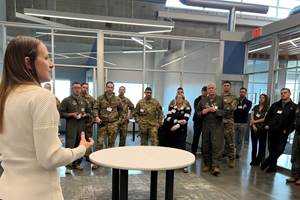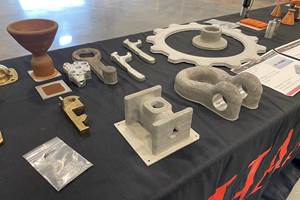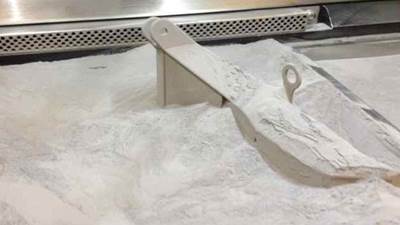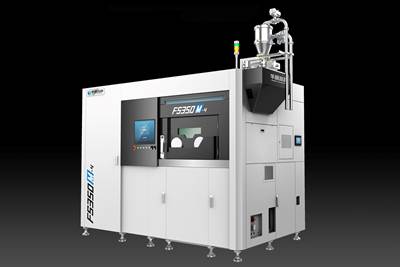NAVAIR AM Team Helps Coast Guard Maintain Operational Readiness
Every Coast Guard MH-60T will carry the additively manufactured spacer as a part of the outfitting.
Share
When the U.S. Coast Guard was unable to procure a wiring system part that affected its entire fleet of MH-60T helicopters in late November, they turned to the Naval Air Systems Command (NAVAIR) Additive Manufacturing (AM) Team. Thanks to a collaborative workplace culture between services and a recognition for urgent solutions at the time of need, the Coast Guard kept its aircraft flying without a break in operations.

An AATS spacer mount installed in an aircraft.
As members of the Coast Guard prepared to upgrade the MH-60T Automatic Asset Tracking System’s (AATS) wiring system and distribute it to the fleet, they noticed one item was missing. “All the parts must be in the kit before the upgrade is pushed out to the fleet,” explains Lt. Cmdr. Andrew Armstrong, Surface Forces Logistics Center Industrial Operations Division National Industrial Enterprise, Organic Depot Maintenance branch chief and Surface Fleet Additive Manufacturing lead. “One unique wiring part, the AATS spacer mount, was unavailable via commercial means; the only approved fabrication method to meet this need is additive manufacturing (AM).”
The Coast Guard’s AM team ran into another problem after its AM shop designed, printed a prototype and began to manufacture the spacing mount. The material to 3D print it, Black Ultem — a polyetherimide material with high mechanical strength and rigidity — was not in stock. Familiar with NAVAIR’s AM capabilities, Armstrong contacted NAVAIR AM Program Manager, Ted Gronda. The Coast Guard already had an approved AM technical data package (TDP) for the part, which specified the same AM machines as NAVAIR’s. Armstrong just needed to transfer the TDP files via the Joint Technical Data Integration (JTDI) website, Gronda says.
The U.S. Navy, and NAVAIR in particular, has a long history of supporting other federal agencies with AM. “It’s an opportunity to strengthen relationships across organizations and create channels for future collaboration and exchange of information. We were more than willing to help,” Gronda says.
Gronda quickly set the NAVAIR AM Team to work. Engineers determined NAVAIR’s AM systems could meet the requirements, so they authorized a deviation for printing on the AM system at Fleet Readiness Center Mid-Atlantic Detachment Oceana in Virginia Beach, Virginia.
However, Lakehurst did not have the thermoplastic AM material on hand. After contacting different NAVAIR sites, the team learned the Polymers Research Branch at Patuxent River had the required thermoplastic. However, getting the material to the AM machines at Oceana posed another challenge.
“Recognizing the urgency and the importance — this impacted the Coast Guard’s entire MH-60T fleet — one of our team members volunteered to drive the materials from Pax River to Virginia Beach that evening, an almost four-hour drive,” Gronda says. While the materials were being delivered, Armstrong uploaded the TDP to JTDI. Then, Naval Air Warfare Center Aircraft Division Lakehurst AM Team Lead, Anna Carlson, modified the build file to print on Oceana’s AM system while still meeting Coast Guard drawing requirements. According to Armstrong, “It’s the first time another service has printed parts for CG aircraft and it was our first upload to a shared database.”
Once the materials arrived in Oceana, Aviation Electronics Technician Petty Officer 2nd Class Charles Oneal downloaded the TDP and began manufacturing the required parts. Within 24 hours, Oneal printed and delivered 15 AATS spacer mounts to Coast Guard representatives.

An AM-produced AATS spacer mount.
Because of the team’s collaboration, forward thinking and can-do attitude, the parts kits will go out much earlier to facilitate the required capability upgrade for the MH-60T fleet. Every MH-60T will carry the additively manufactured spacer as a part of the outfitting, Armstrong explains.
“This effort marked yet another extraordinarily successful example of a cross-organizational collaborative effort,” says NAVAIR AM Polymer Lead, Dr. Kate Thorn. Knowing cases like this will continue to present themselves, she further notes, “We’re now documenting the process, so future needs can be expedited and standardized.”
“I appreciate the priority the Navy gave this effort,” Armstrong says. “Working together, across services, we improved the readiness of a critical asset and reduced the time required to do so.”
Related Content
For Coast Guard, AM Adoption Begins With “MacGyver-ish” Crew Members Who Are Using 3D Printing Already
AM suits the Coast Guard’s culture of shipboard problem-solving, says Surface Fleet AM lead. Here is how 3D printers on ships promise to deliver not just substantial cost savings but also an aid to crew capabilities and morale.
Read MoreBeehive Industries Is Going Big on Small-Scale Engines Made Through Additive Manufacturing
Backed by decades of experience in both aviation and additive, the company is now laser-focused on a single goal: developing, proving and scaling production of engines providing 5,000 lbs of thrust or less.
Read MoreHow a DOD-Funded Resilient Manufacturing Ecosystem (RME) Is Coming Together at Neighborhood 91
Pittsburgh’s additive manufacturing campus doubles as a test bed for a Department of Defense project aimed at developing a reproducible ecosystem for on-demand production of critical parts.
Read MoreNeighborhood 91 Expands, With Metal Powder Works and HAMR Now Open
Ribbon cuttings for the Pittsburgh campus's newest tenants coincided with the announcement that a DOD-funded resilient manufacturing program will also be developed at the site.
Read MoreRead Next
Postprocessing Steps and Costs for Metal 3D Printing
When your metal part is done 3D printing, you just pull it out of the machine and start using it, right? Not exactly.
Read More3D Printed Polymer EOAT Increases Safety of Cobots
Contract manufacturer Anubis 3D applies polymer 3D printing processes to manufacture cobot tooling that is lightweight, smooth and safer for human interaction.
Read MoreBike Manufacturer Uses Additive Manufacturing to Create Lighter, More Complex, Customized Parts
Titanium bike frame manufacturer Hanglun Technology mixes precision casting with 3D printing to create bikes that offer increased speed and reduced turbulence during long-distance rides, offering a smoother, faster and more efficient cycling experience.
Read More.jpg;width=70;height=70;mode=crop)









